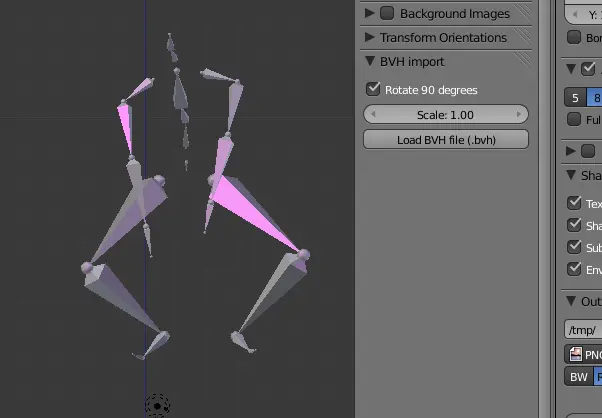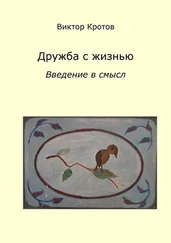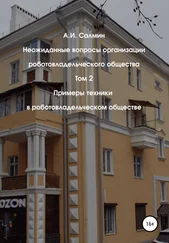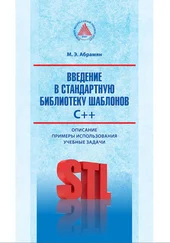После выполнения скрипта или включения его в качестве аддона, простой импортер BVH может быть вызван из панели пользовательского интерфейса ( Ctrl+N ). Есть две опции: логическая переменная с информацией о том, повернуть ли меш на 90 градусов (чтобы направить Z вверх), и масштаб.
Эта программа также показывает, как вызвать диалог выбора файлов, нажав кнопку на панели. Класс кнопки Load BVH наследуется от двух базовых классов bpy.types.Operatorи ImportHelper.
class OBJECT_OT_LoadBvhButton(bpy.types.Operator, ImportHelper):
Класс ImportHelper(возможно, недокументированный) определяет некоторые атрибуты, которые используются для фильтрации файлов, отображающихся в диалоге выбора файлов.
filename_ext = ".bvh"
filter_glob = bpy.props.StringProperty(default="*.bvh", options={'HIDDEN'})
filepath = bpy.props.StringProperty(name="File Path",
maxlen=1024, default="")
Существует аналогичный класс ExportHelper, который ограничивает имеющийся выбор файлов экспорта.

#----------------------------------------------------------
# File simple_bvh_import.py
# Simple bvh importer
#----------------------------------------------------------
bl_info = {
'name': 'Simple BVH importer (.bvh)',
'author': 'Thomas Larsson',
'version': (1, 0, 0),
'blender': (2, 5, 7),
'api': 34786,
'location': "File > Import",
'description': 'Simple import of Biovision bvh',
'category': 'Import-Export'}
import bpy, os, math, mathutils, time
from mathutils import Vector, Matrix
from io_utils import ImportHelper
#
# class CNode:
#
class CNode:
def __init__(self, words, parent):
name = words[1]
for word in words[2:]:
name += ' '+word
self.name = name
self.parent = parent
self.children = []
self.head = Vector((0,0,0))
self.offset = Vector((0,0,0))
if parent:
parent.children.append(self)
self.channels = []
self.matrix = None
self.inverse = None
return
def __repr__(self):
return "CNode %s" % (self.name)
def display(self, pad):
vec = self.offset
if vec.length < Epsilon:
c = '*'
else: c = ' '
print("%s%s%10s (%8.3f %8.3f %8.3f)" %
(c, pad, self.name, vec[0], vec[1], vec[2]))
for child in self.children:
child.display(pad+" ")
return
def build(self, amt, orig, parent):
self.head = orig + self.offset
if not self.children:
return self.head
zero = (self.offset.length < Epsilon)
eb = amt.edit_bones.new(self.name)
if parent:
eb.parent = parent
eb.head = self.head
tails = Vector((0,0,0))
for child in self.children:
tails += child.build(amt, self.head, eb)
n = len(self.children)
eb.tail = tails/n
(trans,quat,scale) = eb.matrix.decompose()
self.matrix = quat.to_matrix()
self.inverse = self.matrix.copy()
self.inverse.invert()
if zero:
return eb.tail
else:
return eb.head
#
# readBvhFile(context, filepath, rot90, scale):
#
Location = 1
Rotation = 2
Hierarchy = 1
Motion = 2
Frames = 3
Deg2Rad = math.pi/180
Epsilon = 1e-5
def readBvhFile(context, filepath, rot90, scale):
fileName = os.path.realpath(os.path.expanduser(filepath))
(shortName, ext) = os.path.splitext(fileName)
if ext.lower() != ".bvh":
raise NameError("Not a bvh file: " + fileName)
print( "Loading BVH file "+ fileName )
time1 = time.clock()
level = 0
nErrors = 0
scn = context.scene
fp = open(fileName, "rU")
print( "Reading skeleton" )
lineNo = 0
for line in fp:
words= line.split()
lineNo += 1
if len(words) == 0:
continue
key = words[0].upper()
if key == 'HIERARCHY':
status = Hierarchy
elif key == 'MOTION':
if level != 0:
raise NameError("Tokenizer out of kilter %d" % level)
amt = bpy.data.armatures.new("BvhAmt")
rig = bpy.data.objects.new("BvhRig", amt)
scn.objects.link(rig)
scn.objects.active = rig
bpy.ops.object.mode_set(mode='EDIT')
root.build(amt, Vector((0,0,0)), None)
#root.display('')
bpy.ops.object.mode_set(mode='OBJECT')
status = Motion
elif status == Hierarchy:
if key == 'ROOT':
node = CNode(words, None)
root = node
nodes = [root]
elif key == 'JOINT':
node = CNode(words, node)
nodes.append(node)
elif key == 'OFFSET':
(x,y,z) = (float(words[1]), float(words[2]), float(words[3]))
if rot90:
node.offset = scale*Vector((x,-z,y))
else:
node.offset = scale*Vector((x,y,z))
elif key == 'END':
node = CNode(words, node)
elif key == 'CHANNELS':
oldmode = None
for word in words[2:]:
if rot90:
(index, mode, sign) = channelZup(word)
else:
(index, mode, sign) = channelYup(word)
if mode != oldmode:
indices = []
node.channels.append((mode, indices))
oldmode = mode
indices.append((index, sign))
elif key == '{':
level += 1
elif key == '}':
level -= 1
node = node.parent
Читать дальше












